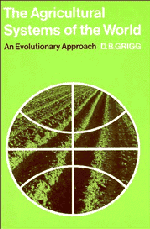Book contents
- Frontmatter
- Contents
- Acknowledgements
- 1 Introduction
- PART ONE
- PART TWO
- 5 Shifting agriculture
- 6 Wet-rice cultivation in Asia
- 7 Pastoral nomadism
- 8 Mediterranean agriculture
- 9 Mixed farming in western Europe and North America
- 10 Dairying
- 11 Plantations
- 12 Ranching
- 13 Large-scale grain production
- 14 Conclusions
- Appendix: Regions of plant domestication
- Notes
- Bibliography
- Index
- Frontmatter
- Contents
- Acknowledgements
- 1 Introduction
- PART ONE
- PART TWO
- 5 Shifting agriculture
- 6 Wet-rice cultivation in Asia
- 7 Pastoral nomadism
- 8 Mediterranean agriculture
- 9 Mixed farming in western Europe and North America
- 10 Dairying
- 11 Plantations
- 12 Ranching
- 13 Large-scale grain production
- 14 Conclusions
- Appendix: Regions of plant domestication
- Notes
- Bibliography
- Index
Summary
The great arid belt of the Old World, from the Atlantic shores of the Sahara to the steppes of Mongolia, has been occupied by oasis farmers and pastoral nomads for at least 3000 years. But in this century the pastoral nomads have greatly declined in numbers and are now of very little significance in the world agricultural economy. There are few reliable records on the numbers of the nomads remaining. In the Sahara there are perhaps just over 1 000 000, and there are approximately 2 500 000 in the Sahel and Sudanic zone to the south and in the Horn of Africa. In the Arabian desert and the steppes of Syria, Jordan and Iraq numbers have greatly declined in this century, and there may now be no more than 6 50 000. In the upland plateaux and mountains to the east of the Arabian desert nomads are still common, and between Anatolia and the mountains overlooking the Indus plain there are about 5 000 000 nomads, especially in the Zagros mountains of Iran and in Afghanistan.
Unfortunately, there is little reliable information on the numbers in Chinese and Russian Turkestan and Mongolia, where in the 1920s they were probably most numerous. The number of nomads in Russia prior to collectivisation has been variously put at between 5 000 000 and 6 000 000. Nor is it clear how far the pressure in China and Mongolia to group nomads into communes and cooperatives has destroyed the traditional economy and converted the nomads to ranchers. But it seems unlikely that pastoral nomads can now exceed 15 000 000 although they still occupy very large parts of the Old World dry belt.
- Type
- Chapter
- Information
- The Agricultural Systems of the WorldAn Evolutionary Approach, pp. 112 - 122Publisher: Cambridge University PressPrint publication year: 1974

